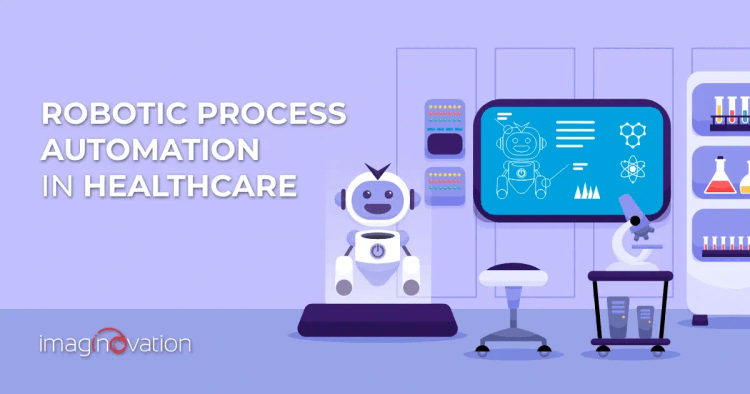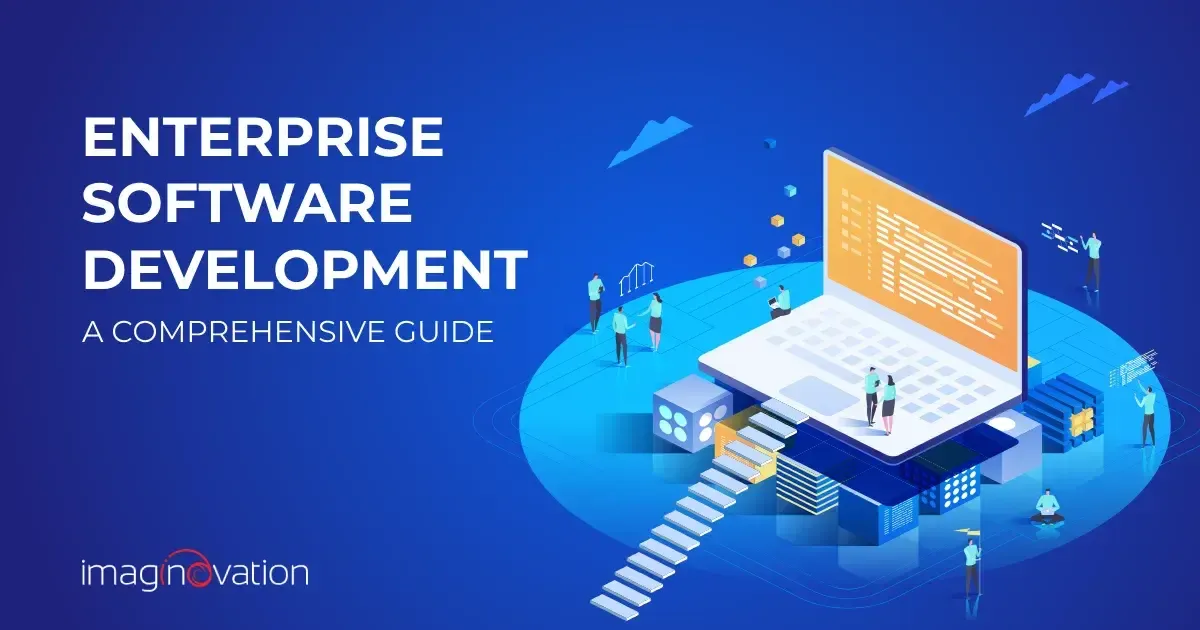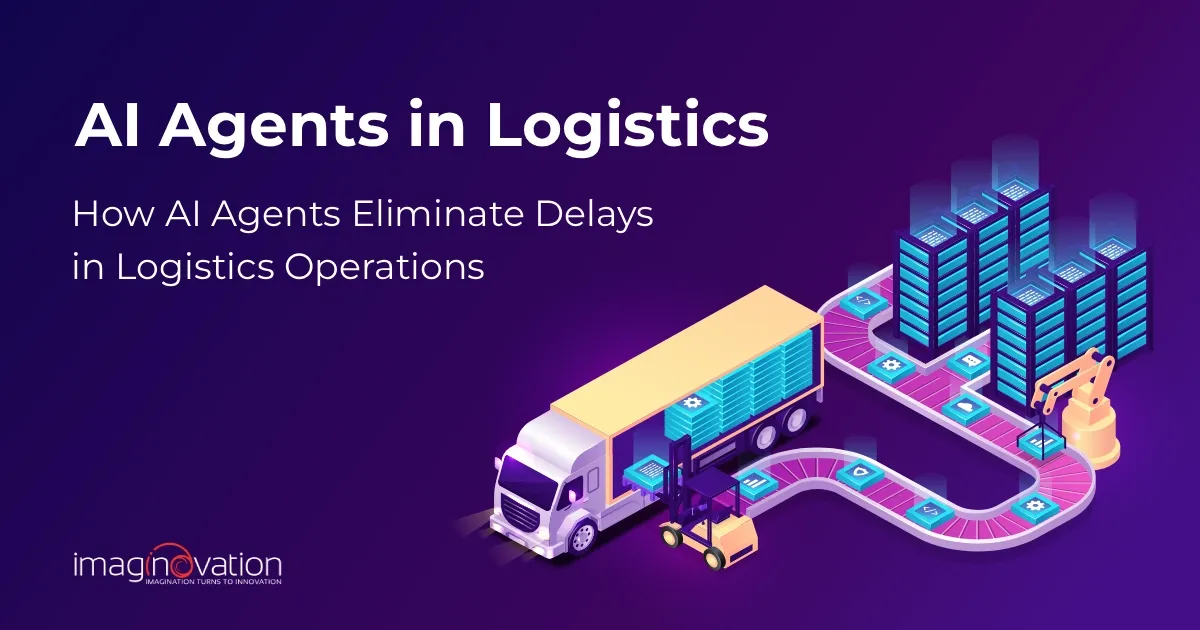To estimate the cost of building a website or an app, use our app cost calculator tool.
Today's healthcare landscape is ridden with redundant processes. Plus, there are high operating costs, high patient volumes, and healthcare professionals experiencing burnout.
Thus, it is vital to implement a technology that can transform the ecosystem, improving the patient experience.
Robotic Process Automation in Healthcare blended with AI can create intelligent solutions. It can enrich the capabilities of the industry. Tag along as we explore the challenges, benefits, and use cases of RPA in healthcare.
Benefits of Robotic Process Automation in Healthcare
Robotic process automation in healthcare uses automation and robotics (also software bots), which perform repetitive tasks. Plus, they can handle high-volume and rule-based tasks too. They emulate human interactions with disparate digital systems of a hospital and can assist healthcare professionals with various routine processes. RPA in healthcare can reduce the challenges with manual healthcare operations and offer solutions focusing on value-based care.
Here's an exciting statistic: Experts predict RPA in the healthcare market will grow at a CAGR of 8.4%, reaching a valuation of $88.9 billion by the end of 2028, attributed to growing concern about affordable healthcare access. The towering figures speak volumes.
Next, let's see what other benefits are in store with RPA in healthcare.
Improve and Customize the Patient Experience
Staff working on repetitive tasks find such jobs mundane, and they consume time that’s not productive. With RPA, staff involvement in monotonous tasks can be reduced, allowing them to shift their time and focus to more complex business areas.
Healthcare staff can invest more time with patients, either face-to-face or virtually. What’s more - patients can get more personalized and value-based care. Ultimately, there's greater streamlined patient onboarding with more visibility in the patient record system, which augments better decision-making.
Better Data Interoperability
Disparate formats make collecting information difficult. However, with RPA blended with technologies like artificial intelligence, machine learning, and OCR, healthcare professionals can create an ecosystem that supports intelligent document processing. Thus, it is more effortless to collect information for any system, and that too in any format, making data access seamless.
Improve Healthcare Monitoring
Data access is made seamless, and it's easier to collect real-time insights from medical records. The ease of data access enables healthcare professionals and clinicians to assist with better diagnosis and extend better pre- and post-discharge treatment. Moreover, RPA bots can support sending reg flag alerts to patients or healthcare staff whenever there are any emergencies or discrepancies.
Improve Employee Satisfaction
RPA bots reduce staff involvement in monotonous tasks. Thus, human capabilities are enhanced, and staff feels relieved. Plus, with the adoption of the technology, healthcare professionals can apply their skills to other areas, which helps boost performance and reduce burnout.
Burnout Prevention
Yet another offshoot is that data-handling tasks are reduced with RPA solutions, which increases employee satisfaction. Further, it prevents the staff from feeling exhausted or considering quitting their jobs.
Streamline Workflow Management
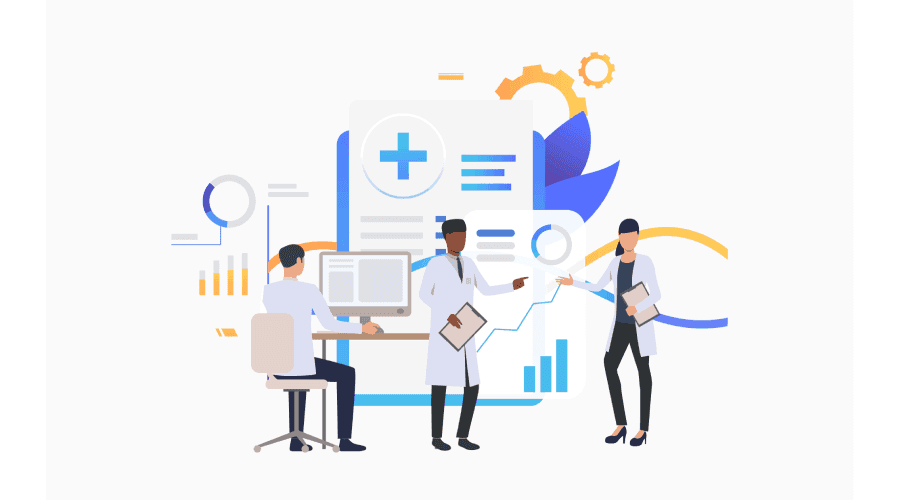
RPA involves using software robots or "bots" that can be trained to do rule-based tasks and streamline workflows. The bots can interact with user interfaces, extract data, and perform predefined actions. Thus, it helps reduce errors caused by manual intervention in the healthcare processes. RPA in healthcare is famous for its better healthcare workflow and for being highly focused on offering value-based patient care.
Cost Management
RPA automates the healthcare processes, optimizing resource utilization, improving data accuracy, and eliminating manual errors. Thus, it limits the requirement of humans, leading to a reduction in operational costs. Plus, healthcare providers can look for accelerating process cycle times and utilize the time to enhance patient care management.
Better regulatory compliance
Data processed with the help of RPA bots can be easily tracked and audited and help optimize the process. It ensures data consistency and helps adhere to compliance regulations in the context of sensitive patient data. The technology assists in decreasing the number of compliance issues.
Enhanced Data Security
RPA detects sensitive patient data without human involvement. The RPA bots allow only authorized people with proper credentials to access a system that has sensitive information, lessening data exposure and vulnerability. Plus, it applies data encryption for more secure data usage.
Scalability
The scalability of RPA is a key selling point. The RPA bots can be as large or small as the healthcare ecosystem needs. Thus, adapting the additional robots can be quickly deployed with no extra or minimal cost, suiting the ever-changing healthcare market.
Use Cases of Robotic Process Automation in Healthcare
Exploring the use cases of RPA in healthcare reveals its transformative potential. From streamlining administrative tasks to enhancing patient care management, each use case demonstrates how automation can revolutionize various aspects of healthcare operations. Let's delve into these individual scenarios to uncover the full impact of RPA in this vital sector.
1. Appointment Scheduling

Appointment scheduling can take a considerable amount of time. It involves intimating the patients, scheduling, and rescheduling. The task can get tedious and prone to errors, especially when it's on a big scale. However, with RPA, appointment scheduling can be streamlined. RPA bots can send timely notifications to patients and remind them of their appointments. Moreover, they can also be informed about any further changes in the appointment schedule because of the doctor's unavailability, avoiding hassles.
2. Billing, Payments, and Claims Management
Processing health care bills can get cumbersome. There are costs for tests, food, doctor fees, medicines, and more. RPA can streamline health care payments, as it helps blend the various costs into one. Thus, healthcare professionals can save time and prevent billing errors. Plus, with the technology in place, it is easy to send personalized reminders to patients if there are any payment delays.
RPA can process time-consuming health claims - for example, to check the status of a health insurance claim, it would take around 85 seconds for a human; in contrast, it takes 12 seconds for an RPA solution. Moreover, developing an RPA solution can help reduce financial losses around claim costs that are caused due to administrative errors.
3. Post-discharge Management
RPA enables holistic post-discharge care. The niche technology with RPA bots allows patients to recover confidently at home after leaving a healthcare facility. The bots can send reminders and important information such as taking medications, nutrients, and follow-ups with the doctors.
Additionally, RPA can encourage patients to measure necessary data, including blood sugar levels, blood pressure, and more. The data can be further sent to healthcare professionals if conditions are of concern. The at-home recovery is well-supported with the technology, augmenting the patient experience.
4. Asset Tracking
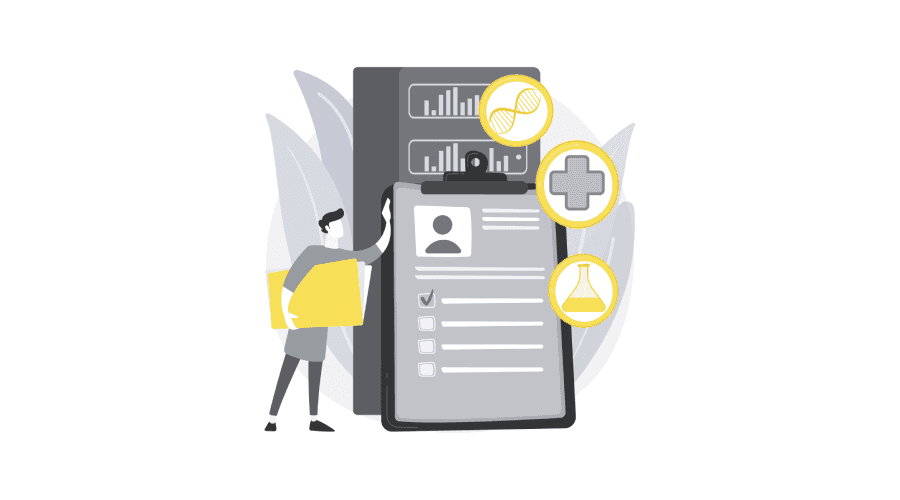
Healthcare asset tracking, which includes assets such as ventilators, defibrillators, medical pumps, and more, enables healthcare professionals to locate medical equipment in real-time, saving time. It reduces the procurement costs to replace lost or stolen equipment.
In fact, according to a study, nurses spend around 6,000 hours a month searching for lost equipment, which is time-consuming. Moreover, if the medical equipment isn't found quickly, it delays treatment and impacts the patient experience.
RPA can be blended with cloud-based control panels and digital sensors to ensure that staff finds assets quickly. Moreover, it can help keep a check on inventories, monitor the assets' condition, and take swift action to replace them if needed.
5. Data Analytics and Diagnostics
Healthcare providers typically deal with significant amounts of patient data. The collected data needs to be analyzed, and RPA can be used to offer valuable insights and analytics. The outcomes can assist healthcare professionals in boosting patient care and improving patient experience, offering accurate diagnosis and treatment. For example, Canadian Telco Telus partnered with Babylon Health to develop a smartphone app that adopts RPA and AI technology to support patients effectively.
Challenges of Implementing Robotic Process Automation in Healthcare
While RPA holds immense potential in healthcare, implementing it comes with its own set of challenges. This section will explore the complexities, ranging from integration hurdles to concerns about data security and compliance, highlighting the crucial factors that must be navigated for successful RPA deployment in healthcare environments.
Cyber Security
With automated tasks, bots get access to sensitive data. The bots can interact with such data, and it is critical to maintain and protect the entire process. An estimated 13 million healthcare or patient records are reported as stolen and sold yearly in the US market. It’s right! The numbers are concerning.
Solution: It is essential to encrypt data during transmission between RPA bots and target systems. Additionally, it is necessary to ensure encryption when storing data in databases or files.
Absence of a Clear RPA Strategy
One of the biggest challenges in the healthcare ecosystem when developing a solution is the lack of clarity on which processes to automate. Healthcare providers have numerous processes that are apt for automation. Thus, working on a strategy to determine the processes to automate needs a solid basis. A defined strategy can help with a solid foundation to meet the current and future scaling needs.
Solution: Before implementing RPA, the healthcare organization needs to define a strategy that can work as a compass for the project. Thus, when working on the strategy - ask:
- Is RPA a permanent or temporary solution?
- What are the objectives for implementing RPA?
- What are the alternative technologies to RPA? List the pros and cons of RPA as a viable solution.
- How do we measure the results?
- What are the future facets of scaling?
Escalating Costs
Yet another challenge the healthcare industry faces is to curb costs while delivering top-notch quality and boosting revenues. As the industry operates in real-time, optimizing resources can become a challenge.
Solution: When automating, project the overall RPA costs. It is vital to consider all contributing factors, which include the price of the automation tool, infrastructure costs, costs of monitoring, maintenance, etc. As you deploy a new solution, adopt the technology that helps measure, analyze, and report both quality and costs. Further, to control costs, bots can be used to relieve employees of mundane tasks, which boosts efficiency, maintains quality, and reduces the costs of low-value activities.
Staff Resistance
When implementing RPA, healthcare organizations may face resistance to change. A few employees may need help to readily switch to adopting new technology or processes, which hinders the implementation process.
Solution: A great way to overcome any volatility or resistance to change is to involve employees in the implementation process. The cohesive involvement helps employees appreciate the benefits of RPA and help them embrace the switch more willingly.
Lack of Technical Expertise
Healthcare organizations considering implementing RPA require technical expertise, which they may not have in-house. The lack of experts makes it difficult to implement RPA effectively.
Solution: When one does not have in-house expertise, it is best to partner with a trusted RPA provider, such as Imaginovation. The partnership ensures the proper implementation, allowing the organization to enjoy the benefits of RPA.
Post-deployment Issues
As regulations and business needs change, automated processes (RPA bots) must be aligned with them. Additionally, even slight changes in the process can confuse the bots and result in errors.
Solution: It is vital to assign a responsible person to be the owner of the RPA solution and perform maintenance tasks, which include monitoring bot operation, running endurance testing, making adjustments, and more.
Ensuring HIPAA Compliance
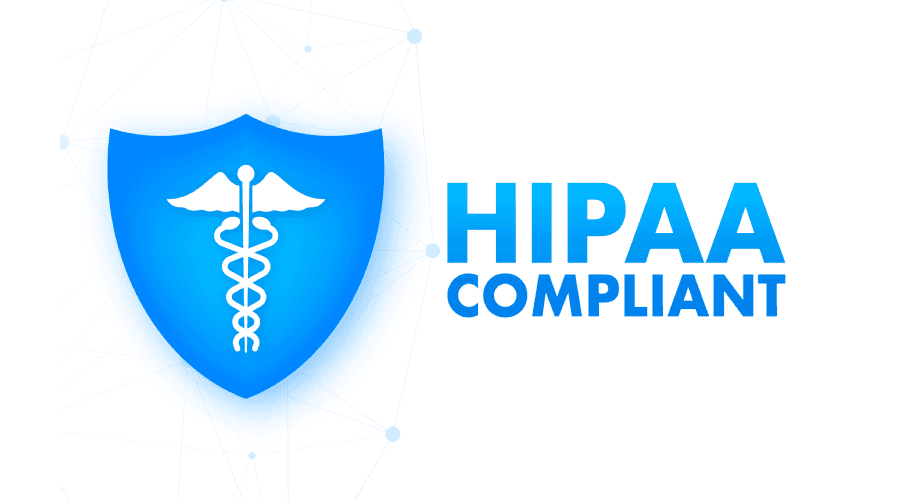
Healthcare organizations must comply with the Health Insurance Portability and Accountability Act (HIPAA) when implementing RPA. The challenge centers around the use of sensitive patient data by RPA.
Solution: Partnering with an RPA provider who understands HIPAA regulations is best. The partner can implement the RPA solution in a HIPAA-compliant manner.
Examples of Successful Robotic Process Automation Implementation in Healthcare
RPA in healthcare organizations has several benefits; let's look at real-world examples of successful implementation.
Secure between-system data transfer
Healthcare organizations may have various systems like attendance, HR, and staffing systems. The systems need proper data synchronization, accurate report generation, and data updates and backups that are safe and secure.
The University of Texas MD Anderson Cancer Center adopted an RPA solution based on the Fortra Automate platform for secure between-system data transfer, report generation, and critical data updates and backup.
The solution was easy to configure and implement, ensuring optimal staffing levels and enhancing patient care. Additionally, it reduces the administrative burden and is saving the center around $150,000 yearly with an ROI of 650% due to the implementation of automated tasks.
Electronic records and data sharing
Health data is a treasure trove and comes from patients, insurance companies, health record databases, and more. RPA can play a key role in ensuring electronic data sharing in healthcare and adhering to privacy protocols. Additionally, RPA can also help with fast detection and response times to cyberattacks, preventing data loss.
For example, Dorset, a county in the southwest of the UK, has implemented RPA to allow GPs to have quick access to medical records using a robot called Wyman. The bots based on AI can perform tasks efficiently. Wyman could create thousands of user records in a fraction of the time that it would typically take.
Increasing inventory precision and streamlining processes
McKesson Corporation, one of the top providers of healthcare services, has been using RPA for healthcare to manage inventories. With RPA, they can streamline the supply chain and fill orders. The company has been adopting the applications of RPA to increase inventory precision. Additionally, it has been working on lowering manual errors and ensuring prompt delivery of medical supplies.
Appointment scheduling
Appointment scheduling can be a seamless experience with the adoption of RPA. For instance, RPA can help make, reschedule, or cancel appointments without hassle.
A good example is in the UK; the East Lancashire NHS Trust uses RPA to work on scheduling appointments to the tune of an average of 15,000 referrals that they receive each month.
Wrapping Up
RPA can revolutionize healthcare operations. However, it poses some challenges that need to be dealt with care. When you partner with a proficient solution provider, you can evaluate the suitability and develop RPA solutions that best fit to your needs. The opportunities to improve patient outcomes and satisfaction are too hard to ignore. So, get ready to ride the wave of change and enhance your healthcare operations with RPA.
Build Powerful RPA Solutions with Imaginovation
In the evolving landscape of healthcare, the adoption of process automation solutions is essential. RPA offers the healthcare industry a chance to enhance patient care and streamline operations. This is the perfect time to integrate this technology and extend automation beyond traditional practices.
By investing in RPA, healthcare providers can automate routine tasks, minimize errors, and focus more on patient care. Imaginovation specializes in developing customized RPA solutions that cater to the specific needs of the healthcare sector.
Our team is ready to assist you in overcoming the challenges of healthcare automation. With our expertise, you can improve operational efficiency and patient experiences. Partner with us to create an RPA solution that transforms your healthcare services.
Contact Imaginovation today to embark on a journey of digital transformation in healthcare. Let's achieve new heights in patient care and operational excellence together.





